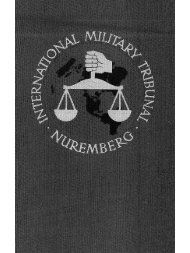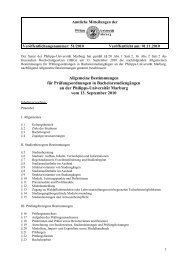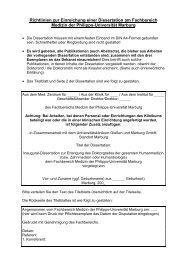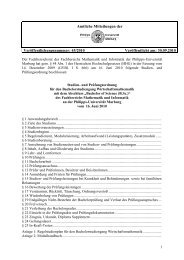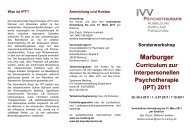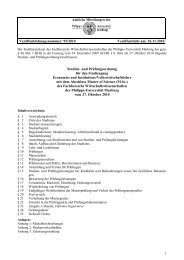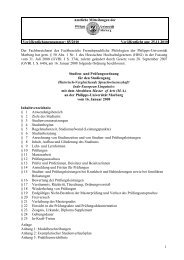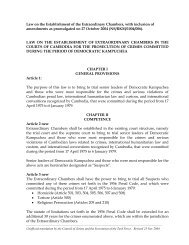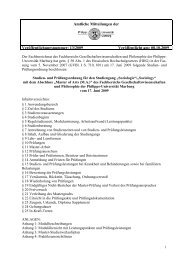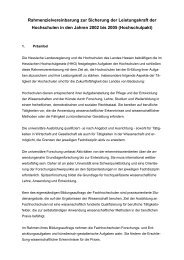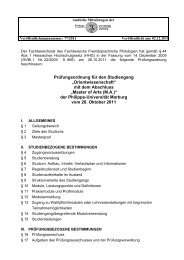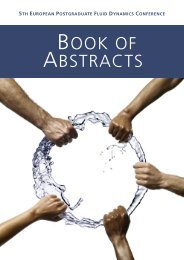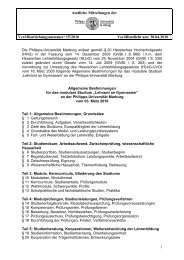Peace and Conflict Studies - uni-marburg
Peace and Conflict Studies - uni-marburg
Peace and Conflict Studies - uni-marburg
Create successful ePaper yourself
Turn your PDF publications into a flip-book with our unique Google optimized e-Paper software.
Lehr- und Lernformen, Veranstaltungstypen<br />
On successful completion of the module, students will have acquired:<br />
- SLO1: advanced familiarity with the main theoretical approaches used<br />
to explain public policy making.<br />
- SLO2: the ability to trace <strong>and</strong> explain the development of the main<br />
policies of the European Union <strong>and</strong> in so doing have gained a thorough<br />
underst<strong>and</strong>ing of these policies.<br />
- SLO3: an underst<strong>and</strong>ing of the process of policy making in the EU,<br />
from policy formulation <strong>and</strong> negotiation through to implementation at<br />
the national level.<br />
- SLO4: the ability to engage critically with important political issues<br />
facing policy makers in the EU both at national <strong>and</strong> European levels.<br />
- SLO5: the ability to produce well-argued <strong>and</strong> well-informed written<br />
analyses of these important issues <strong>and</strong> their consequences for future<br />
policy making in the EU.<br />
These specific learning outcomes contribute to achieving the learning<br />
outcomes of our taught postgraduate Masters level programmes. Students<br />
successfully completing Masters level programmes in the School<br />
of Politics <strong>and</strong> International Relations will be able to:<br />
- demonstrate specialised knowledge of, <strong>and</strong> critical insight into, the key<br />
historical <strong>and</strong> theoretical issues in their programme area, together with<br />
familiarity with appropriate bibliographical sources.<br />
- apply theoretical <strong>and</strong> conceptual frameworks to the analysis of politics<br />
<strong>and</strong> international relations.<br />
- use a variety of research methods <strong>and</strong> evaluate critically their application<br />
in the scholarly literature.<br />
- conduct research in politics <strong>and</strong> international relations demonstrating<br />
awareness of epistemological, methodological <strong>and</strong> ethical principles.<br />
The intended generic learning outcomes <strong>and</strong>, as appropriate, their relationship<br />
to programme learning outcomes<br />
Students who successfully complete this module<br />
- GLO1: will be able to work with theoretical knowledge at the forefront<br />
of their discipline.<br />
GLO2: will be aware of the ethical dimensions of the scholarly work<br />
done in their discipline in general as well as of their own work in particular.<br />
- GLO3: will have a comprehensive underst<strong>and</strong>ing of methods <strong>and</strong><br />
methodologies in their discipline<br />
- GLO4: will be able to undertake analysis of complex, incomplete or<br />
contradictory area of knowledge.<br />
- GLO5: will have a level of conceptual underst<strong>and</strong>ing that will allow<br />
them to critically evaluate research, advanced scholarship <strong>and</strong> methodologies<br />
<strong>and</strong> argue alternative approaches.<br />
- GLO6: will be reflective <strong>and</strong> self-critical in their research work.<br />
- GLO7: will be able to engage in academic <strong>and</strong> professional comm<strong>uni</strong>cation<br />
orally <strong>and</strong> in writing.<br />
- GLO8: will have independent learning ability required for continuing<br />
professional study.<br />
By helping students to progress towards these generic learning outcomes,<br />
the module contributes to achieving the general aims of our<br />
taught postgraduate programmes, which aim to:<br />
- provide students with an advanced training in their disciplines.<br />
- develop the students’ transferable skills emphasizing research skills,<br />
analytical <strong>and</strong> conceptual skills, independent work <strong>and</strong> self-organisation.<br />
Vorlesung und Seminar<br />
40



